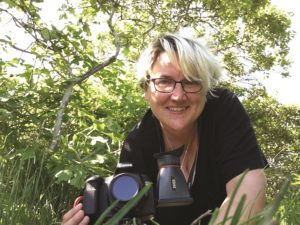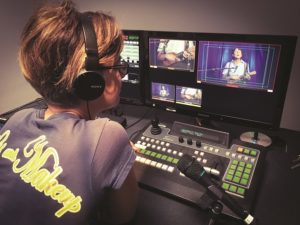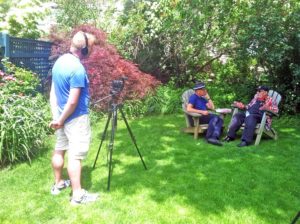“Community television is about telling the story of a community directly through the voice of the residents,” says Amy Davies. “And that is very appealing to me.”
Davies is executive director of Provincetown Community Television (PTV), a nonprofit community media center that offers two basic cable channels to residents: Channel 18, which airs town meetings, and Channel 99, which is dedicated to creative expression. Making community members comfortable with the idea of creating their own content for Channel 99 is, Davies says, one of the most important aspects of her job.

“It’s a strange hobby to have,” she admits with a laugh. “If you knit a really ugly sweater and it looks terrible, you just put it away. But when you create a program and put it out on television, it’s very public. I think people can get intimidated, and that’s not what we’re about. We’re about handing you equipment, showing you how to use it, and letting you go and try stuff.”
In the face of Covid restrictions that limit public access to PTV’s studio at 330 Commercial St., Davies has been trying to facilitate community involvement virtually. One way will be teaching a course she’s calling “Using Media for Communication and Creativity” as part of the town’s “Winter Whenevers” program.
Each of Davies’s six weekly online classes (Thursday mornings through Feb. 25; register at winterwednesdays.org) will focus on different ways to connect virtually, and they will all include aspects of the art of storytelling.
“Every project starts with a story,” Davies says. “The story is what gets me interested and keeps me interested. Telling a compelling story doesn’t require a $30,000 camera. You can have an unlimited budget and all of the fancy equipment in the world, and it’s meaningless if you don’t connect with the viewer. We connect through storytelling.”
Davies has participated before in the town’s free winter courses (which were “Winter Wednesdays” pre-Covid, all in person on Wednesday evenings). “When we joined last year, it was a fantastic experience. Learning together took the intimidation factor away for many, and there were a lot of new faces,” she says. “Podcasting was one of the most popular classes, so this year, we’re going to talk about podcasting for Zoom. We’ve produced a few virtual events in town for nonprofits, so I’m going to have an event planner come in. We are also going to go through how to make a slide show to send to your family.”

Though Davies’s passion for her work is palpable, she says she doesn’t have a background in video or filmmaking. “I was working at a school in Harwich when someone from C3TV — now Cape Cod Media Center — came in to teach a class for kids after school. He said, ‘You can come in, take a class, learn how to use the equipment, and make your own television shows.’ I was blown away. I took a basic studio production class and loved it,” she says.
Davies started working at Cape 11 News as videographer and director in 1997, and, after holding positions at a number of Cape community stations, she joined PTV as public access director in 2013, then executive director in 2016.
“Public access TV started as a way for towns to get something in return for giving cable television the rights of way through municipalities,” Davies says. PTV is funded in large part by subsidies from local Comcast (Xfinity) cable TV subscriptions. “The idea is for not every aspect of the cable system to be commercial. How often is there a direct benefit from a large corporation to the individuals in an area?”
Anyone who lives in Provincetown (or is sponsored by a resident) can access hands-on training, field production equipment, editing computers, and a multimedia lab at PTV’s studio, with or without previous experience.
PTV does not select or edit contributions. “Content is not filtered through me, and it’s not filtered through some corporate entity,” Davies says. “We are a free speech forum. The people who produce the programming are responsible for the content. There are some restrictions: you can’t promote a pyramid scheme or put out something that is pornographic or shows illegal activity. No hate speech. But opinions are opinions. We don’t alter programming. We are a common carrier.”

Programs created and aired by community members range from a two-minute musing on the delights of the ocean to full-length documentaries. Residents have also covered events, such as the Provincetown International Film Festival or Carnival parade, interviewing celebrities and participants.
“Some people come in and say, ‘I’ve been wanting to make this documentary for 20 years.’ I’ll tell them that should not be the first thing they work on,” Davies says. “Make a program that is a few minutes long. Learn how to plan, use the camera, edit with graphics and music. If you try to tackle a two-hour documentary as your first project, you can get very frustrated. But if you work your way up to this goal, you can achieve it.”
Locals have made PTV content unique. “Because everything in Provincetown is infused with art, this brings a higher level of quality to every aspect of what people do, whether they consider themselves artists or not,” she says. “Being creative is in the fabric of the town — it is ever present, as is the sense of wonder for all this place has to offer.”
Ready for Your Close-Up
The event: Amy Davies teaches “Using Media for Communication and Creativity,” part of Provincetown’s “Winter Whenevers” program
The time: Thursdays, 11 a.m. to noon, six sessions, Jan. 21 through Feb. 25
The place: winterwednesdays.org
The cost: Free



